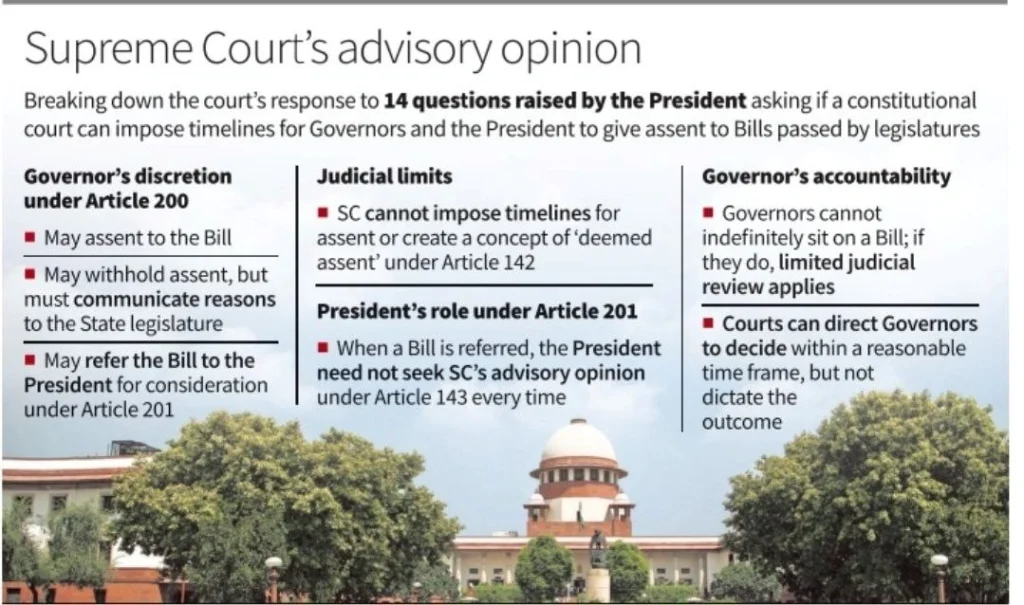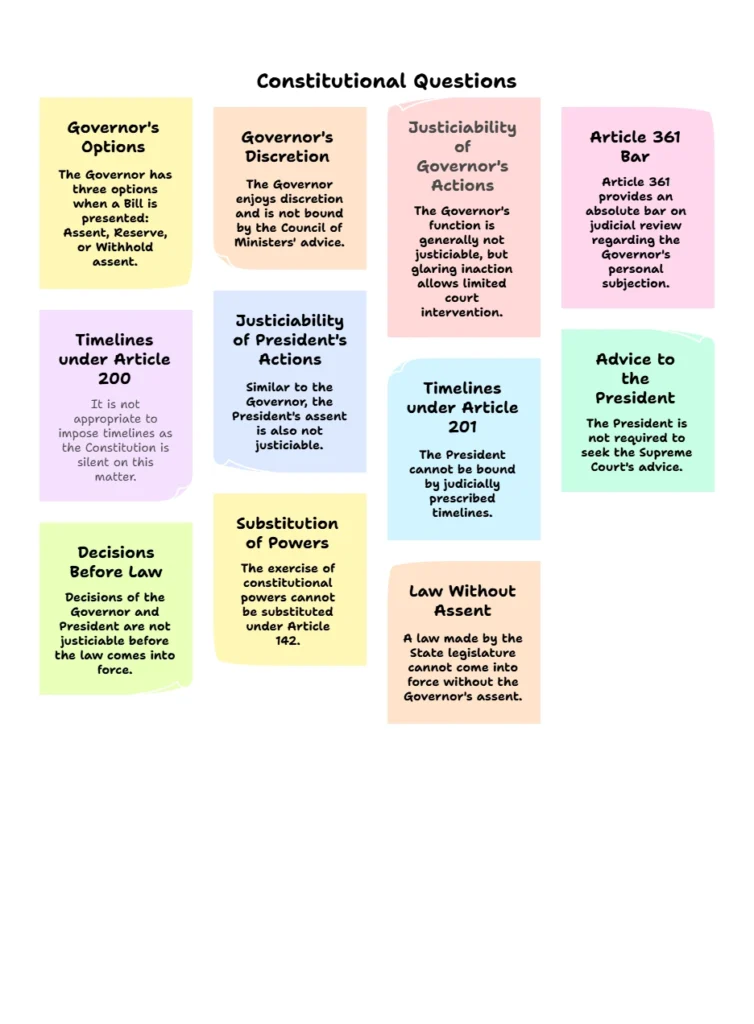Paper: GS – II, Subject: Polity, Topic: Judiciary, Issue: SC on Presidential Reference.
Context:
A five-judge Supreme Court Bench ruled that courts cannot impose fixed timelines or assume “deemed consent” for Governors and the President in approving State Bills.
Key Takeaways:
Article 143:
- Article 143(1): Enables the President to refer any question of law or fact of public importance to the Supreme Court, which may answer or decline to answer.
- Article 143(2): Covers disputes related to pre-Constitution treaties or agreements; the Court must give its opinion.
Article 145(3):
- Mandates a Constitution Bench of at least five judges for hearing a Presidential Reference, after which the SC returns the reference to the President with the majority opinion.
- Nature of Opinion: Advisory only, not binding or precedent-setting, but carries persuasive value, usually followed by the executive and courts.
- President of India generally acts on the advice of the Union Council of Ministers while making a reference.
- Used Cautiously: Invoked only about 15 times since 1950, indicating its exceptional character.


Key Takeaways from the Supreme Court’s Opinion:
- Separation of Powers: The Court emphasized the importance of upholding the separation of powers doctrine, cautioning against the judiciary usurping the functions of the executive branch.
- Limited Judicial Review: While generally refraining from interfering with the Governor’s and President’s constitutional functions, the Court acknowledged a limited power to intervene in cases of prolonged and unexplained inaction.
- No Timelines: The Court declined to impose fixed timelines on the President and Governors for acting on State Bills, recognizing the complexities and nuances involved in such decisions.
- Governor’s discretion under Article 200: The Bench clarified that a Governor is not constitutionally bound to give assent even if a Bill is re-presented by the legislature.
- This interpretation strengthens the Governor’s deliberative role but must be exercised within reasonable time to respect democratic accountability.
- Balance of Power: The Court sought to strike a balance between respecting the constitutional prerogatives of the executive branch and ensuring that State legislatures are not unduly hampered by prolonged inaction.
The Article 143 Presidential Reference clarifies judicial limits, executive accountability, and separation of powers, strengthening constitutional balance and India’s federal democratic framework through interpretative guidance.
La Excellence IAS Academy, the best IAS coaching in Hyderabad, known for delivering quality content and conceptual clarity for UPSC 2025 preparation.
FOLLOW US ON:
◉ YouTube : https://www.youtube.com/@CivilsPrepTeam
◉ Facebook: https://www.facebook.com/LaExcellenceIAS
◉ Instagram: https://www.instagram.com/laexcellenceiasacademy/
GET IN TOUCH:
Contact us at info@laex.in, https://laex.in/contact-us/
or Call us @ +91 9052 29 2929, +91 9052 99 2929, +91 9154 24 2140
OUR BRANCHES:
Head Office: H No: 1-10-225A, Beside AEVA Fertility Center, Ashok Nagar Extension, VV Giri Nagar, Ashok Nagar, Hyderabad, 500020
Madhapur: Flat no: 301, survey no 58-60, Guttala begumpet Madhapur metro pillar: 1524, Rangareddy Hyderabad, Telangana 500081
Bangalore: Plot No: 99, 2nd floor, 80 Feet Road, Beside Poorvika Mobiles, Chandra Layout, Attiguppe, Near Vijaya Nagara, Bengaluru, 560040
